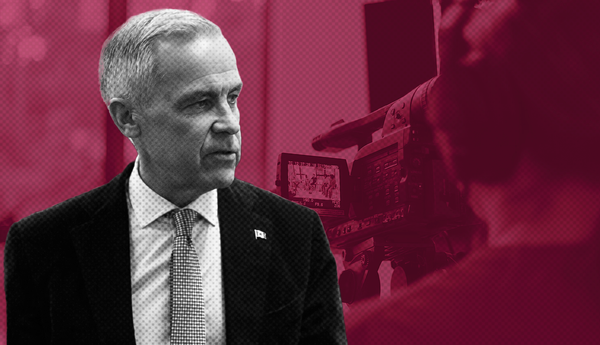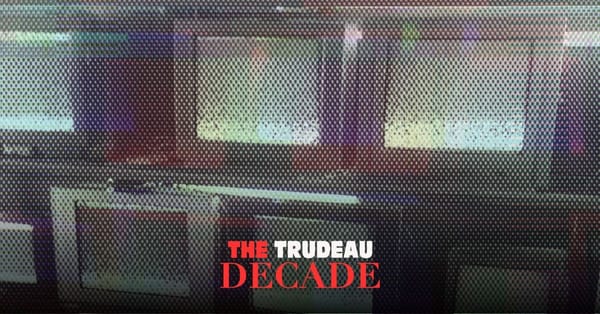Last week, HuffPost Canada and HuffPost Quebec were abruptly shut down by their new owner, BuzzFeed. The news came three weeks after BuzzFeed officially took ownership of HuffPost, and two weeks after the Canadian newsroom successfully unionized.
Employees found out this news in a company-wide meeting (with the password: “spr!ngisH3r3”), which contractors weren’t invited to attend. The Canadian newsroom closure was reportedly the third item on the agenda, after cuts to workforces in the United States and United Kingdom. The website’s front page was taken down the day the closure was announced. Nobody in Canada had received prior warning.
While tragic, layoffs have come to be a grimly routine part of the journalism industry. Think back to 2017, when Torstar and Postmedia swapped ownership of 41 local newspapers before shutting down 36 of them. That eliminated 290 jobs, sparked a shelved Competition Bureau investigation and created regional monopolies and local news deserts.
HuffPost Canada’s closure feels particularly galling for a number of reasons — the dashed hope from recent unionization, the harsh way it was handled, the award-winning content, the specific personal stories. One journalist was a contractor whose full-time employment kept being delayed, meaning she likely won’t be eligible for severance despite spending nearly two years there. Another editor had only been back at work for a week, after a two-year sabbatical to fight cancer.
There’s also the fact that BuzzFeed has made an effort to not seem like the type of place that would callously cut dozens of employees. They post diversity reports and tout the company as “an environment where everyone feels empowered to be their authentic self.” They wouldn’t run ads for Donald Trump back in 2016. Their newsroom’s recent stories have covered racism in The Bachelor, gendered violence and Amazon’s role in spreading conspiracy theories. Their Twitter account has a Gen Z eat-the-rich tone. But the ostensibly progressive front masks the fact that the company is funded by a venture capitalist system that demands ever-increasing revenue.
BuzzFeed, the company, raised almost 500 million USD in eight rounds of venture capitalist funding between 2006 and 2016. In 2016, it was valued at $1.7 billion. In 2020, the company announced that they’d turned a profit for the first time since 2014. That success was achieved through cutting costs by around $30 million — including layoffs, furloughs and pay cuts.
In fact, BuzzFeed regularly lays off staff members to decrease costs and prove to investors that they’re trying really hard to make more money.
Here’s a run-down of all the recent BuzzFeed layoffs I could find:
- 2017: About 100 staff (“largely […] advertising sales and business operations”)
- 2018: 20 staff, and later “a handful” of in-house podcasters
- 2019: Around 220 staff, including 43 journalists
- 2020: 50 U.S. staff (including 10 from BuzzFeed News), and 10 U.K. and four Australia staff
- 2021: 47 U.S. staff, 23 Canada staff and 16 jobs put “at risk” in the U.K.
That’s more than 470 jobs in the past five years, including writers, journalists and content creators. And marginalized staff have taken the brunt of the damage.
The company was accused on Twitter of disproportionately targeting racialized and LGBTQ employees in the 2019 layoffs, and again in 2021: 12 per cent of unionized staff cut from the U.S. newsroom are Black, compared to 6.8 per cent of the union as a whole. Even the podcasting losses in 2018 disproportionately affected racialized staff.
These cuts are bad news for women in media too: the U.K. staff affected are mostly women, and HuffPost Canada’s newsroom had the greatest percentage of women authors of any major Canadian media outlet.
But in a way, the HuffPost closures shouldn’t come as a surprise. HuffPost Canada was shut down due to what BuzzFeed called “business losses and local economic conditions.” And the cuts to U.S. staff are, according to the company, part of “a model that will enable HuffPost to break even this year.”
Prioritizing profit over people is a core tenet of capitalism. As long as BuzzFeed cares more about breaking even than breaking news, it will never be the progressive company it portrays itself as. It’s up to consumers to look past the PR to see corporations for what they actually are — in all their shareholder-pleasing, staff-cutting reality.
And maybe they are. When BuzzFeed News recently tweeted asking, “What is the most disgusting thing your rich pals have done during the pandemic?” they received more than 1,300 replies and 1,300 quote tweets almost all making the same argument: millionaire BuzzFeed founder Jonah Peretti laying off dozens of journalists in a pandemic is pretty gross indeed.
CLARIFICATION: This article has been updated to note that a HuffPost Canada contractor may still be eligible for severance.







